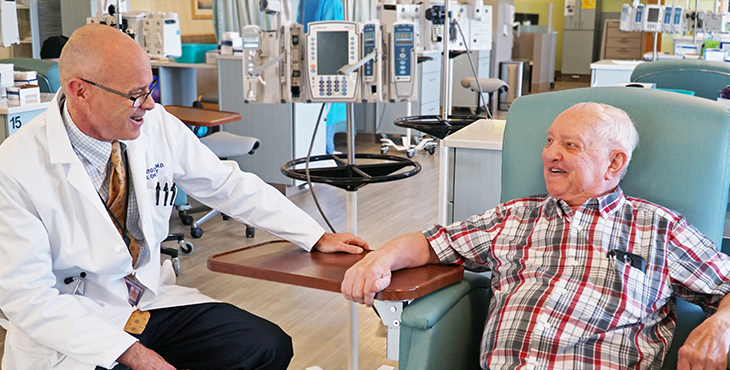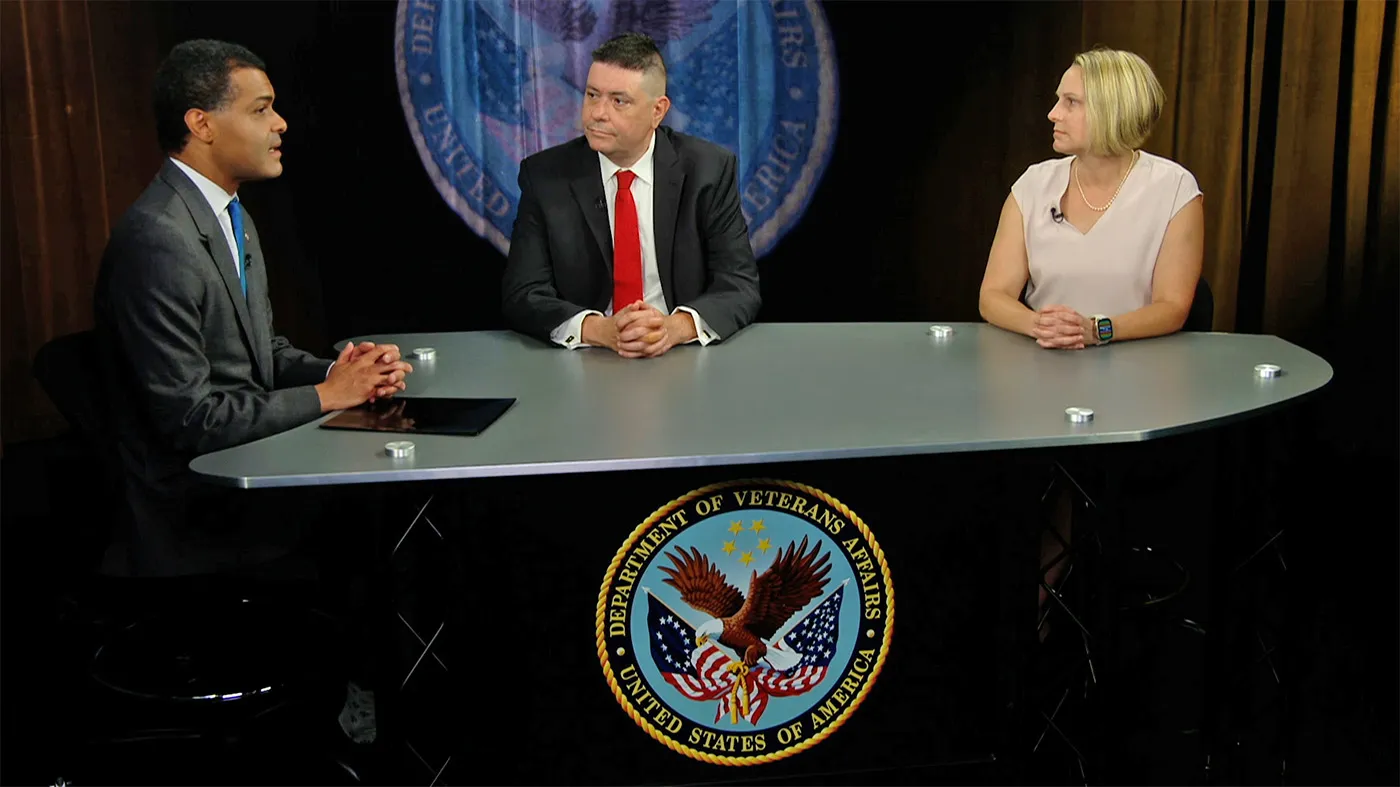Targeted cancer therapy. That’s what “precision oncology” is all about.
The approach is based on the specific genes and proteins within a tumor. Increasingly, doctors are able to choose drugs that target those individual biological signatures. The result is more effective treatment.
Veterans and others can learn more about what VA is doing in this area by attending an upcoming lecture, online or in person.
On Monday, Feb. 24, 1 –2:30 p.m. EST, VA’s Office of Research and Development is sponsoring a presentation at VA headquarters by oncologist Dr. Bruce Montgomery. The title is “Precision Oncology for Veterans with Prostate Cancer: Who, What, How, and Why.”
Montgomery is the co-lead for the Precision Oncology Program for Cancer of the Prostate. The program is a partnership between VA and the Prostate Cancer Foundation.
Montgomery says the work promises to have a wide impact, in VA and beyond.
“The whole idea behind this effort was to stand up an integrated precision oncology system in VA and show that if we can do this in the biggest health care system in the U.S., then the optimal efficiency and outcomes can be extended outside of VA and provide better results for everybody.”
Talk geared for lay people
His talk Feb. 24 will be geared for lay people, including VA patients and employees. Montgomery will cover the program’s mission, goals and progress. The aim is to inform VA staff, external partners, Veterans, and the public about the steps VA is taking to better treat metastatic prostate cancer. “Metastatic” refers to cancer that has spread in the body.
Join in person at 810 Vermont Ave. N.W., Washington, D.C., in the Sonny Montgomery Conference Room (230), or online. People should pre-register at www.research.va.gov/events. The website has a link to attend the lecture online, as well as instructions for those who plan to attend in person.
To read more about the VA-Prostate Cancer Foundation partnership focused on Veterans with prostate cancer, visit the VA research website.
Photo: Dr. Bruce Montgomery meets with Navy Veteran Allen Petchnick, whose prostate cancer has been effectively treated to date with targeted therapy. (Photo by Christopher Pacheco)
Topics in this story
More Stories
Diverse representation of women in health care research allows MVP to make discoveries for women’s health
Join the Million Veteran Program online. You will have the option to receive an at-home blood sample collection kit in the mail.
VHA's new podcast series, New Horizons in Health, features a candid discussion of psychedelic assisted therapies for Veterans experiencing mental health conditions.







The VA has been monitoring my PSA level since I was 50, just over 10 years ago. My PSA level reached 4.4 in 2016, in which time I was referred out to Naval Hospital Pensacola, where a blind biopsy was taken. It came out negative. For the next three years, my PSA level kept climbing until it reached 8.97 in May, 2019. I was sent out through TriWest for a Pelvic MRI with emphasis on the prostate. It came back and showed I had two lesions, one a Gleason Scale 3, and the other a Gleason Scale 4. I was sent back out to Naval Hospital Pensacola for a TRUS Fusion Biopsy. Out of 12 sectors, 9 came back positive. My urologist at the VA was very honest, and told me my prostate needed to be removed, as it was too far gone for any other treatment.I was referred out again through TriWest to a urologist who specialises in roboric prostate removal. He was very thorough in explaining my level of cancer, and I agreed it was best to have my prostate removed. On 12 Nov 19, I underwent a radical prostatectomy with the DaVinci Robot. I had a Foley Catheter for 8 days post-op. Along the way, I had several setbacks. A day after I was discharged, I developed Ilius, where my intestines weren’t working. I had a CT scan to confirm it, and I was admitted to the hospital for three days. A few days after the catheter was removed, I developed a severe UTI, and had to go to the ER once a week for 3 weeks for IV antibiotics and morphine.
Today is 23 Feb 20, and I am still partly incontinent. I can generally hold a large stream of urine for a short time, but I do have leakage when I laugh, cough, bend over, lift things, and sneeze. I wear Depends for Males. I do Kegel exercises three times a day.
My advice. Listen to what your urologist tells you is the right treatment.
Had seed implant 2005 things went well for 10 years then PSA started to increase. VA wanted to watch and do nothing. Chose to go to cancer centers of America who stated that waiting and watching should not be an option. They suggested removal of female hormones< I chose the injections every six Months. Things went well for five years now PSA has doubled in less than six Months. VA again wanted to wait and watch I did not feel this was acceptable. Went back to Cancer centers of America and they suggested Enzalutamide 40 Mg. Started this medication and PSA went from 7 to .050 in less than 8 weeks.
The main issue is ED since taking the Female Hormones and now the new meds it is even worse. Doctor stated that I will always have the cancer and all that can be done is treatment. The new Medication is very expensive so I go back to the VA and thy agree that this treatment is best. I have all the symptoms of a female mood changes, sweats, and weakness are just a few. My suggestion would be have it removed, unless you can give me a suggestion how to cope with the situation?
My Cancer is confined to the Prostate (Diagnosed 09/16/2016). It was being monitored until just recently.
I’ve had one Hormone (Leuprolide, LUPRON) shot on 01/09/2020 with 3 more scheduled per month. I am scheduled to begin radiation at the beginning of March.
Am I a candidate for “Targeted Cancer Therapy?
Don Drouin
Brachytherapy works! I’m a veteran who came down with prostate cancer in February of 2007 at age 60. I didn’t want prostate removal surgery so did a lot of information gathering with different doctors about my options and I decided Brachytherapy was my best choice. That involves no open surgery. It is done in a hospital by using a long needle and implanting several unique, highly radioactive metal seeds directly into the prostate. I received 85 seed implants. The whole procedure took about 3 hours and was done as an outpatient. I had Brachytherapy treatment on January 24, 2008 and have followed it up with PSA tests every year since then. It took about 6 months after the procedure was done for my PSA levels to drop to virtually zero and the tests have stayed there every year thereafter. I am now 73 years old. To date, February 20, 2020, I am still cancer free. And the best part is that my sex life has not changed. Everything still works as it did in my younger years. I have now been cancer free for over 12 years. I think Brachytherapy is an excellent option for many men with prostate cancer. I hope Dr. Bruce Montgomery discusses Brachytherapy as a possible option for veterans in his presentation to be held on February 24, 2020.
If you can’t attend in person, there is an option to hear the lecture online at:
Web portal: https://site-332278.bcvp0rtal.com/
If you cannot listen in on Feb. 24, the lecture will be archived and available for on-demand viewing. A link to the archived lecture will be published at: https://www.research.va.gov/events/default.cfm
Please provide me with a electronic copy. I was diagnosed with prostrate cancer on December 24th and have gone through 44 episodes of radiation.
Very helpful. How do I hear presentation on Feb 24
I’m receiving radiology for prostate cancer on the day and time of your online presentation. Assuming it will be repeated how and where can I receive it?
Is there a way to get a transcript of the lecture, or key information, online later? I won’t be able to attend in person or electronically.
Doug
I would like to see this presentation but there is no information about how to access this information. I am a disabled vet.
Ray